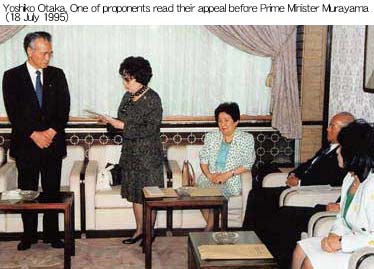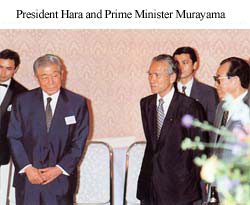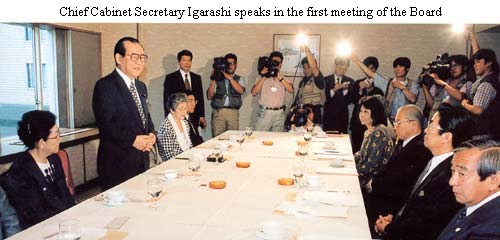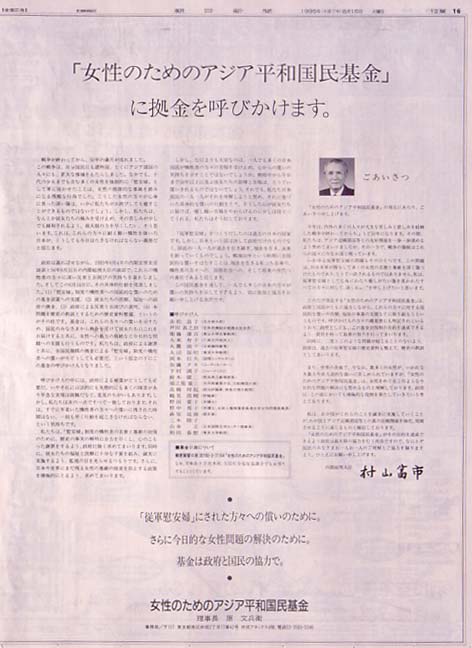 |
Establishment of the AW Fund, and the basic concept of its projects |
  |
| |
 On 18 July 1995, Prime Minister Murayama's statement regarding the Fund
(Full Text On 18 July 1995, Prime Minister Murayama's statement regarding the Fund
(Full Text ) and the Fund proponents' "Appeal for Donations for the Asian Women's Fund" were made public at a press conference. ) and the Fund proponents' "Appeal for Donations for the Asian Women's Fund" were made public at a press conference. |
| An Appeal for Donations for the Asian Women's Fund
Fifty years have elapsed since the war came to an end.
The war caused enormous horror and ravaged the people of Japan and many other nations, especially those in Asia. Particularly brutal was the act of forcing women, including teenagers, to serve the Japanese armed forces as "comfort women," a practice that violated the fundamental dignity of women. No manner of apology can ever completely heal the deep wound inflicted on these women both emotionally and physically. Yet we should, by whatever means, do our best to appreciate their pain and make the greatest possible effort to salve their suffering in any way we can. We believe the obligation to do so today hangs heavy over Japan, the country that inflicted the suffering.
The Government of Japan has expressed its deep remorse, albeit belatedly, apologizing to the victims through the Chief Cabinet Secretary's statement of August 4, 1993, and the Prime Minister's statement of August 31, 1994. Further, on June 14 of this year, the Cabinet announced a concrete action plan, which is to be based upon four pillars:
- Support will be given to the establishment of a fund that invites the people of Japan to atone for the institution of "comfort women".
- The Government will contribute funds to the welfare and medical care of these women.
- The Government will express remorse and apologize.
- Historical documents and materials will be collated that will help make this a lesson to be drawn on.
Moneys from the AWF - donated by the Japanese as an offer of atonement to the "comfort women" - will be delivered to the women, as well as be used to provide support for measures to cope with current-day issues such as the eradication of violence against women. We have gathered together to propose this fund in the conviction that atonement in the form of compensation by the people of Japan to the victims of the institution of "comfort women" is urgently needed now, along with an apology by the Government.
Some of us proponents differ in our views. Some, for example, believe Government compensation is absolutely necessary, while others believe such compensation will be difficult to realize in a prompt manner because of legal and practical impediments. We are, however, united in one regard - our burning desire to take action immediately, because the time left to compensate these women of advanced age is running short.
We will continue to urge the Government to spare no effort in bringing to light all the facts of the case, and to express a heartfelt apology, in order that the honor and dignity of the victims of the institution of "comfort women" be restored. At the same time, we will be vigilant in our effort to make sure the Government apportions ample budgetary outlays and uses these funds to fully provide, in good faith, for the welfare and medical care of the victims. We will continually demand that our Government pursue an active policy of working to prevent still remaining infringements upon the dignity of all women, both in Japan and throughout the world.
Of paramount importance, however, is the need for as many Japanese citizens as possible to appreciate the suffering of the victims and to express a genuine desire for atonement. The indignities and pain suffered by these women, both during the war and in the fifty years since, can never be fully compensated for. But we are convinced that, if each and every citizen of Japan would do his or her best to understand the plight of the victims, and then act in a concrete manner to make amends, and if such a commitment - coming, as it must, from the heart - could reach the women involved, then our actions would help mitigate, to some extent, the trauma they have lived through and continue to live with.
It is the Japanese nation of the past that created the "comfort women." But Japan is not the government alone. Like other, Japan is a nation in which each citizen must shoulder the legacy of the past, live in the present, and create the future. To make amends for the past, then, fifty years after the fact, is our responsibility - we, the present generation, owe it to the victims, to the international community, and to future generations.
We sincerely urge you to take part in and contribute to this national fund, in order that as many Japanese citizens as possible translate into action the desire to make amends.
18 July 1995
Proponents of the
"Asian Women’s Fund"
| Ryoko |
AKAMATSU |
| Jinnosuke |
ASHIDA |
| Shinkichi |
ETO |
| Toshiko |
OKITA |
| Yoshiko |
OTAKA |
| Yasuaki |
ONUMA |
| Yukio |
OKAMOTO |
| Taki |
KATO |
| Mitsuko |
SHIMOMURA |
| Kenji |
SUZUKI |
| Ryozo |
SUNOBE |
| Yoshikatsu |
TAKAHASHI |
| Shunsuke |
TSURUMI |
| Aiko |
NODA |
| Kuniko |
NONAKA |
| Nobutoshi |
HAGIWARA |
| Mutsuko |
MIKI |
| Isamu |
MIYAZAKI |
| Tadashi |
YAMAMOTO |
| Haruki |
WADA |
|
|
|
|
 The following day, 19 July 1995, the first Directors' meeting was held, and the Josei no Tameno Ajia Heiwa Kokumin Kikin (in English, National Fund for Asian Peace and Women), or in short, the Ajia Josei Kikin (in English, the Asian Women's Fund), was officially established. At the end of that month, Bunbei Hara, the previous President of the House of Councilors, was chosen as the Fund's President. The following day, 19 July 1995, the first Directors' meeting was held, and the Josei no Tameno Ajia Heiwa Kokumin Kikin (in English, National Fund for Asian Peace and Women), or in short, the Ajia Josei Kikin (in English, the Asian Women's Fund), was officially established. At the end of that month, Bunbei Hara, the previous President of the House of Councilors, was chosen as the Fund's President.
|
|
|
 |
The year 1995 was the 50th anniversary of the end of the war, and on 15 August full-page advertisements in the morning editions of six national newspapers covered Prime Minister Murayama's Statement regarding the Fund and the Fund proponents' appeal.
Also, before noon on this day, a statement by Prime Minister Murayama on the occasion of the 50th anniversary of the end of the war (Full Text ) was released. The new statement reflected decisions taken by the Cabinet, and included these words: ) was released. The new statement reflected decisions taken by the Cabinet, and included these words:
|
 |
|
|
|
"During a certain period in the not too distant past, Japan followed mistaken national policies and took the road to war, ensnaring the Japanese people in a fateful crisis and inflicting, through colonial rule and aggression, great damage and pains on people in many countries, especially in Asia. Regarding in all humility these irrefutable facts of history, and in the hope that no such mistake will be made in the future, I express once more my feeling of deep remorse and state my heartfelt apology."
On that day, the Fund received 14.55 million yen in donations. By the end of the month, 37.78 million yen had been donated. Donations reached 133.75 million yen by the end of 1995, more than 200 million by March 1996, more than 300 million by April, and more than 400 million by June of that year.
The Government of the Republic of Korea welcomed the Fund's establishment with such comments as "there is an element of public support for some projects, involving financial resources from the government budget"; "there was a straightforward expression of remorse and apology, given by the state to those concerned"; and "statements included a clearly expressed desire to discover what happened and to use that information as a lesson of history." These were welcomed as "sincere measures."
|
  |
|
|
|

